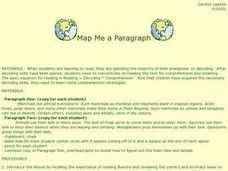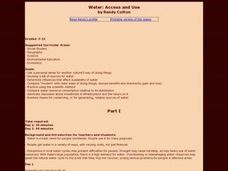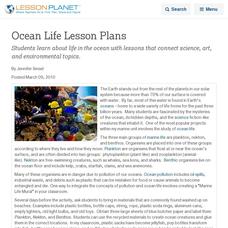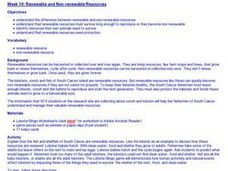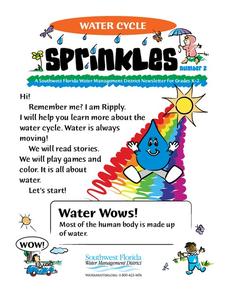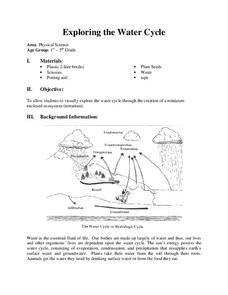Curated OER
Go To The Head of the Cloud
Students pretend they are water droplets traveling through the water cycle. Using their text, they discover the steps in the cycle and the different paths water can take. They write a report about their journey through the water cycle...
Curated OER
Mammals of the Deep Blue
Third graders study ocean mammals. They explore various websites and databases to answer questions and record answers about whales and dolphins. Finally they use the information obtained to write a report about them.
Curated OER
Follow a Fish
Students choose a fish from anywhere within the Ocean Center. They observe it for a given time, recording its behavior. Students comprehend the concept that living things have individual characteristics that enable them to live in their...
Curated OER
Renewable vs. Non-Renewable Resources
Here's a fine lesson on renewable and non-renewable sources of energy for your 5th graders. In it, learners list a number of natural resources on the board, then try to sort the resources into appropriate categories. This helps them to...
Curated OER
Map Me a Paragraph
There are so many great reading strategies. In this lesson, learners practice decoding. They break down two paragraphs to analyze and determine main ideas and details. They each observes ways to model as they map their paragraphs.
American Museum of Natural History
A Closer Look at Mars
A website looks at how we know so much about Mars—telescopes, robots, and spacecraft—and the search for martian life. Following the informational text are three questions that quiz pupils about possible life on Mars.
Curated OER
Plankton / Phytoplankton
Learners discuss the importance of plankton in the ocean ecosystem. For this biology lesson, students identify the different types plankton by observing them under the microscope. They explain how plankton population affect global climate.
Curated OER
Cloze Activity: The Water Cycle
In this recognizing the water cycle cloze activity instructional activity, students use the words in the word box to fill in the blanks about evaporation, condensation, precipitation, and runoff. Students write 23 answers.
Curated OER
Endangered Species !: Why Are Species Endangered?
Young scholars explore the various issues and problems faced by endangered species globally. They research the plight of endangered species, create a poster of a selected animal, and present their poster and research to the class.
Curated OER
In The Zone
Third graders identify ways that ocean animals grow, survive, reproduce, and adapt. They use computer Internet skills to acces and collect information. They create a PowerPoint presentation. They demonstrate writing skills throughthe...
Curated OER
Habitats and Adaptations
Students research and describe the habitat and adaptations of a reef animal. After the student is assigned a habitat, they design and draw a cresture adapted to eat each food and to live in each habitat.
Curated OER
Life Has A History
In this biology worksheet, students identify and match various classes of species found today. Then they explain why biodiversity exists today on earth and define evolution. Students also describe who a paleontologist is and what they do.
Curated OER
Water Cycle (Grades 2-4)
Students demonstrate their understanding of the water cycle and how it effects the environment by graphically depicting and describing the water cycle.
Curated OER
Water: Access and Use
Students get a personal sense for another culture's way of doing things. Develop a list of sources for water. Practice using the scientific method. Examine means for conserving, or for generating, reliable sources of water.
Curated OER
Echinoderms and Invertebrate Chordates
In this echinoderms instructional activity, students will read information about echinoderms and invertebrate chordates. Then students will compare their similarities and differences by completing 1 short answer question.
Curated OER
"Wet" Your Appetite: Conserving Water
Students investigate how water is utilized in producing food. In this agriculture lesson, students examine how much water goes into the creation of their daily menu. Students create a new menu that can conserve water and cut their water...
Curated OER
Ocean Life Lesson Plans
Students learn about life in the ocean with lessons that connect science, art, and environmental topics.
Curated OER
Renewable and Non-renewable Resources
Students play Lobster Bingo on a provided worksheet. This game demonstrates how human activities and natral events affect lobsters by impacting their food, clean water, and shelter of the reef.
Curated OER
Rain Forest Adventures
Students identify and describe where tropical rain forests are located and examine the geographical correlation between rainfall and rain forest. They brainstorm what they think they know about tropical rain forests - where they're...
Curated OER
Sprinkles
In this science worksheet, students read a water trip rebus. Pictures replace several of the words in the article. They color a picture of the water cycle and add arrows to show the direction the water is moving. Students draw a picture...
Curated OER
Forces That Shape the Earth: Plate Movement
In this tectonic plate worksheet, students learn about the movement of the plates that make up the earth's crust. They read about the Theory of Pangaea, lithosphere, divergence, convergence, and plate transformation. Students then answer...
Curated OER
The Chambered Nautilus
For this chambered nautilus worksheet, students read a 2 page article, define 10 vocabulary words and answer 7 short answer questions in complete sentences.
Curated OER
What Do We Need In Our Environment To Survive?
Students discuss and write about waste management to save the environment. In this environment instructional activity, students discuss what an alien coming to Earth would notice about the environmental needs of humans for survival. They...
Curated OER
Exploring the Water Cycle
Students investigate the water cycle. In this water cycle instructional activity, students create an ecosystem within a 2-liter bottle. Students record scientific observations as they observe the water cycle within their ecosystem.






